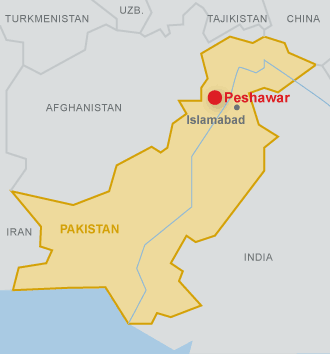
The training, which took place in seven courses, enabled a total of 431 girls to earn their own income by sewing and other handicrafts. The course also included the handling of finances, reading and writing, encouragement and strengthening of self-confidence as well as health prevention. After graduation, the young women were given a sewing machine with which to create their products. The programme was accompanied by workshops for family members with information on children's and women's rights.
Background
Due to the military conflicts in Afghanistan and the Pakistani tribal areas, around two million people have fled to Peshawar since 1979. Poverty, precarious hygienic conditions, desolate medical care and a lack of educational opportunities determine the lives of the refugees in many places, which at the same time are strongly influenced by conservative customs and traditional behavioural patterns. The most vulnerable group among them are the girls. In accordance with the traditional distribution of roles, they have little access to schooling and are dependent on their families.
Project goals
To enable 60 particularly needy young women per year from different parts of Peshawar to attend a course in sewing and other handicrafts, which will enable them to practise a profession with which they can earn their own income.
The effect of the "Give Me a Chance" course goes far beyond ordinary vocational training. The participants should develop into self-confident young women with their own needs and new perspectives, who know and can claim their rights and freedoms.
Project development
The first 15 girls started their three-month course in 2009 in the Danishabad district. In addition to promoting manual skills, the main focus was on strengthening their self-confidence and educating their parents about children's and women's rights. The course also included financial management and health prevention.
Based on the experience gained in the first year, the number of female participants per course in the second course in the Haji Camp district was increased to 30 and the course duration extended from three to six months. This enabled more sewing and cutting techniques to be taught and the course content on health, sex education and women's rights to be deepened. The project management also commissioned a specialist to teach the girls strategies for successful market access. In October 2011, a third round started in the Dir Colony quarter. An additional teacher improved the quality of the sewing training, and the curriculum was expanded to include candle making. To this end, the project management decided to involve the male family members more closely in the sensitization process regarding children's and women's rights, so that they can support the young women in their educational process.
The fourth edition of the "Give Me a Chance" vocational training course began in October 2012 in the Din Bahar district. The production of candles introduced in the previous year and the soap boiling, which was offered for the first time, proved to be very valuable components. Entire families, led by the young women, had meanwhile begun to make products. Basic knowledge of balanced nutrition was added to the hygiene and health course. For the fifth course from October 2013, the project management chose the Saeed Abad quarter. In this course, techniques for preserving food (jams, chutneys, pickled vegetables, ketchup, syrup, etc.) were taught for the first time. The sixth course started in 2014 in the middle of the historic old town near Kohati Gate and the seventh and final course in 2015 in the very poor Changarabad district.
Support from the EEF
The NGO Flowers was founded in 2002 and works for disadvantaged street children in Peshawar and in the border region to Afghanistan. A board member of the equal education fund (EEF) knew the organisation and encouraged cooperation. It turned out to be a great advantage that we could fall back on the stable organisation of Flowers.
During visits to Peshawar, the EEF President was informed about the course of "Give Me a Chance" and had the opportunity to gain insight into the courses for young women and girls. He was impressed by the professionalism and commitment of the teachers and social workers. And also the enthusiasm of the students: The young women showed great interest in more skills and information. Some persuaded the parents to also enable their brothers and sisters to receive an education or to attend school. The eating habits and hygiene improved not only among the girls, but also in their families. In this way, the course participants initiated development processes within their homes in many ways.
A total of 431 young women from seven different parts of Peshawar received basic manual labour training between 2009 and 2016. Our goal was to develop a successful project concept that would decisively change the economic situation and social status of the beneficiary women. The "Give Me a Chance" concept proved to be very efficient and effective, and it is very gratifying that the former course participants started to train other young women in the techniques they had learned. Not only has the situation of more than 400 young women improved directly thanks to "Give Me a Chance", the knowledge imparted is actively passed on and some of the achievements will continue in the future.

Gallery
_gallery_teaser.jpg?lm=1572453338)
Pakistan "Give Me a Chance" Picture Gallery 2016
view album
_gallery_teaser.jpg?lm=1572453044)
Pakistan "Give Me a Chance" Picture Gallery 2015
view album
_gallery_teaser.jpg?lm=1572452846)
Pakistan "Give Me a Chance" Picture Gallery 2014
view album
_gallery_teaser.jpg?lm=1572452739)
Pakistan "Give Me a Chance" Picture Gallery 2013
view album
_gallery_teaser.jpg?lm=1572452629)
Pakistan "Give Me a Chance" Picture Gallery 2012
view album
_gallery_teaser.jpg?lm=1572452469)
Pakistan "Give Me a Chance" Picture Gallery 2011
view album
_gallery_teaser.jpg?lm=1572452382)
Pakistan "Give Me a Chance" Picture Gallery 2010
view album
_gallery_teaser.jpg?lm=1572452308)
Pakistan "Give Me a Chance" Picture Gallery 2009
view album
